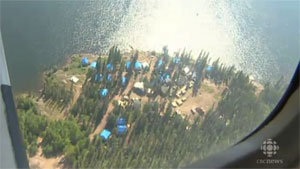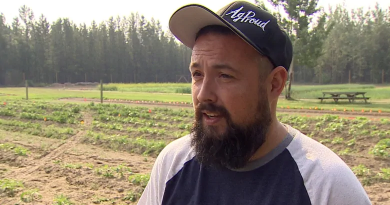Nunavut’s territorial election set for Oct. 27, campaign begins Monday

Nunavut’s territorial election campaign officially began on Monday with voting day set for Oct. 27.
There are 22 seats in the Nunavut Legislature, which has a consensus style of government.
Anyone who wants to put their name forward to run for MLA needs to register with Elections Nunavut by Friday at 2 p.m. local time.
Voter turnout in the Nunavut general election has been declining since it became its own territory in 1999. In the 2021 election, 47.9 per cent of eligible voters submitted a ballot.
In order to qualify to vote in the territorial election, you need to have lived in Nunavut for at least one year.
For people temporarily away from home during the general election – including people on holiday, in prison, hospital, treatment centre, and students – there’s a special mail-in ballot.
Voters must apply to Elections Nunavut to get a special ballot, starting Sept. 22.
For voters who cannot get to the local polling station easily – such as Elders, persons with disabilities, and their caregivers – there’s a option for pollsters to come to your door a week before election day. Anybody wanting a mobile poll option must contact their local returning officer or Elections Nunavut to schedule the vote.
New electoral boundaries are being introduced this year in Arviat, Igloolik and Iqaluit.
Some ministers leaving territorial politics
Cabinet minister’s Lorne Kusugak and Margaret Nakashuk are not seeking re-election.
Neither is the territory’s premier, P.J. Akeeagok, who in July, said he wanted to spend more time with his family, which is “time that public life often demands we set aside.”
There are four ministers who are looking for another go.
John Main, Pamela Gross, and David Joanasie are seeking re-election in the constituencies of Arviat North-Whale Cove, Cambridge Bay, South Baffin respectively.
Quttiktuq MLA David Akeeagok – who represented the communities of Resolute Bay, Arctic Bay and Grise Fiord where he was raised – is also running again but this time in the riding of Iqaluit-Niaqunnguu.
As a consensus style government, there are no political parties and candidates run as independents.
Members of the cabinet are chosen after the general election. Newly-elected MLAs gather to select the speaker, premier and ministers in a secret ballot election.
With files from TJ Dhir
Related stories from around the North:
Canada: Housing a key priority for Nunavut politicians ahead of federal budget, CBC News
Denmark: Denmark takes over rotating Arctic Council chairship from Norway, Eye on the Arctic
Greenland: EU reaffirms Greenland’s right to decide its future amid rising Arctic tensions, Eye on the Arctic



